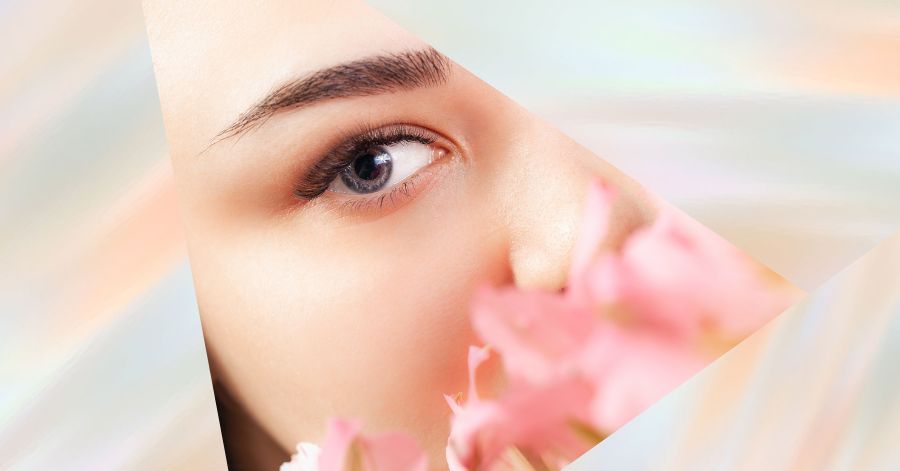Droopy Eyelid, Why and How to Firm up the Eyes
Eyelids are made up of two folds of the thinnest skin on our body, protecting our eyes from dryness and foreign bodies. When we blink our eyes, eyelids spread tears evenly around the eyes to keep them hydrated and water away dust and debris. One of the first sign of aging is shown in the eyelids because it is the most used areas of the face.
Droopy eyelid (Ptosis) is when the upper eyelid droops downward. Treatments are usually not necessary unless you feel it causes aesthetic concerns that makes you look tired and aged or when it covers part of the pupil, reducing the field of vision.
Droopy eyelid can happen at birth or later in life due to eye damages or simply natural path of aging. In this article, we will focus on the later two causes and how to prevent sagging skin.
Eye damages that cause pre-mature droopy eyelid can happen suddenly or gradually. Some of the causes may include:-
- Injury or stretching of eyelid muscle or ligaments by use of rigid contact lenses, excessive eye rubbing
- Botox injection complication
- Damage to the nerve controlling the eyelid muscles such as third nerve palsy, neurological or paralytic disease
- Eye surgery complication
Natural skin aging that cause droopy eyelid happens gradually. The upper eyelids loose skin elasticity and the eyelid muscles weaken and lost its tone over time, making the eyes look more lax. In the circumstance where the eyelid droopy so far downward to block vision, it may trigger a natural reaction to raise the eyebrow, adding stress and tiredness to other facial muscles, advancing the development of forehead wrinkles and eye wrinkles.
Sagging Skin Home Remedies & Tips
To treat sagging skin, HIFU facials, Laser facials, microneedling are all powerful beauty technologies but they are not suited for the delicate skin covering our eyes even though they help to keep skin on the forehead or near the eyes more lifted, ultimately helping the overall look. Here are some droopy eyelid specific remedies you may consider:-
Guasha massage and face rolling - gentle yet effective when performed regularly. It pushes out toxins and flushes skin cells with oxygen and nutrients rich blood to maintain elasticity and suppleness.
Microcurrent massages - will be helpful if the cause is due to Botox injection or application of eye drops. In some cases, it’ll naturally correct itself after a month or so when the effect of Botox subsides.
Avoid rigid contact lenses - repeated tearing and pulling can cause unintentional damage.
Avoid eye rubbing - excessive rubbing may cause unintentional damage and redness.
Eyelid massage - warming massage with hot & cool facial device increases circulation and improve nerve responses.
Eyelid exercises - this will improve muscle strength and promote skin health. This can either be done by fixing your eye to an object to using beauty gadgets to warm and relax the eye muscles and then other beauty gadget such as vibration roller to exercise an isolated muscle around the eye passively.
Wear sunglasses - not only does it help to protect the delicate skin around the eyes by blocking UVA and UVB radiation, it helps to prevent excessive squeenching of eyes from the bright sun that unnecessarily tired the muscles around the eyes.
Rest your eyes regularly - Numerous researches have indicated the risks of excessive screen exposure to computer, television or mobile to vision. Eye fatigue causes unnecessary squeenching of the eye. We learnt about the 20-20-20 rule as an easy guide to reduce eye strain. Look away for 20 feet for 20 seconds after every 20 minutes of screen time or close-up focused activities will be helpful in reducing eye strains.
Botox injection - choose a beautician with experience. According to Journal of Clinical and Aesthetic Dermatology, Botox injections by inexperienced injectors are mostly connected to droopy eyelid in aesthetic medicine. Incorrect placement of Botox injections paralyze the muscles in the eyebrow or eyelid.
Surgery - A cosmetic surgery involving local anesthesia to remove excess skin and underlying tissue can improve the condition. All surgeries involve some level of risk. This type of surgery is considered straightforward and will very likely to improve vision and appearance. Consult your eye doctor or aesthetician for more details.
.png?width=180&height=80&name=imgpsh_fullsize_anim%20(1).png)
